Flexibility & Success in Hybrid Work Models 2025

In 2025, businesses are increasingly realizing the importance of Hybrid Work Models 2025 to drive both flexibility and organizational success. These models allow employees to work in ways that suit their preferences while ensuring business continuity. Companies embracing hybrid work as a strategic tool achieve higher productivity, engagement, and innovation. The focus is no longer solely on location but on outcomes, culture, and the integration of technology to support seamless operations.
Redefining the Modern Workplace
Hybrid Work Models 2025 are more than just remote work policies—they represent a strategic rethinking of work structure. Employees alternate between office, home, and co-working spaces depending on their roles and tasks. Businesses focus on creating workflows and collaboration methods that function efficiently regardless of physical location, emphasizing communication, clarity, and accountability.
Flexibility as a Core Success Factor
Flexibility drives success in Hybrid Work Models 2025. Allowing employees to choose where and when they work improves engagement, creativity, and job satisfaction. Organizations that establish clear guidelines, expectations, and accountability structures ensure that flexibility does not compromise productivity. Flexibility is now a key differentiator for attracting and retaining talent in competitive industries.
Leveraging Technology to Enable Hybrid Work
Technology is essential for Hybrid Work Models 2025. Cloud collaboration tools, AI-driven project management, and secure digital communication platforms allow teams to work seamlessly from any location. Tools such as virtual meeting software, shared digital workspaces, and workflow automation enhance productivity while reducing operational friction. Companies that invest in technology infrastructure enable employees to collaborate efficiently and contribute effectively regardless of location.
Effective Communication Strategies
Maintaining strong communication is vital in Hybrid Work Models 2025. Multi-channel communication strategies, including video calls, instant messaging, and project management platforms, help employees stay aligned and informed. Regular team check-ins, clear updates, and transparent communication foster trust and engagement, ensuring hybrid teams operate cohesively.
Building a Strong Hybrid Culture
Culture is a cornerstone of Hybrid Work Models 2025. Organizations must foster inclusion, recognition, and shared values to ensure distributed teams feel connected. Virtual events, digital recognition programs, and collaborative platforms strengthen engagement and maintain a sense of belonging. Companies with strong hybrid cultures enjoy higher employee retention, motivation, and productivity.
Outcome-Oriented Performance Management
Hybrid Work Models 2025 emphasize outcome-oriented performance over hours logged. Continuous feedback, goal alignment, and project-based evaluations provide a more accurate assessment of employee contributions. Digital dashboards and AI analytics allow managers to monitor progress in real time and support employees proactively, driving accountability and enhanced results.
Cybersecurity Considerations
Security is critical in Hybrid Work Models 2025. Distributed work increases exposure to cyber risks, requiring zero-trust frameworks, multi-factor authentication, encrypted communications, and secure cloud systems. Regular cybersecurity training ensures that employees understand best practices, protecting sensitive data while maintaining hybrid productivity.
Employee Well-Being and Engagement
Hybrid Work Models 2025 prioritize employee well-being. Flexible work arrangements blur the line between professional and personal life, potentially causing stress or burnout. Organizations are providing wellness programs, mental health resources, and flexible schedules to maintain balance. When employees feel supported, their engagement, motivation, and productivity increase.
Promoting Equity and Inclusion
Equity and inclusion are essential to Hybrid Work Models 2025. Companies ensure remote employees have equal opportunities for advancement, visibility, and participation. Practices such as remote-first meetings, fair project distribution, and transparent evaluations foster equity and build trust across hybrid teams. Inclusive workplaces drive collaboration, engagement, and higher overall productivity.
Continuous Learning and Development
Skill development is crucial in Hybrid Work Models 2025. Organizations are investing in AI-driven learning platforms, virtual workshops, and mentorship programs to keep employees up-to-date with evolving technologies and workplace trends. Continuous learning improves performance, innovation, and organizational resilience, preparing employees for future challenges.
Leadership in Hybrid Environments
Leaders in Hybrid Work Models 2025 focus on trust, empathy, and adaptability. They guide teams through clear communication, mentorship, and support, empowering employees to deliver results independently. Leadership that emphasizes collaboration and inclusivity strengthens team cohesion and drives productivity across hybrid environments.
Optimizing Office Spaces for Hybrid Work
Physical office spaces in Hybrid Work Models 2025 are designed to complement remote work. Hot-desking, collaborative hubs, and creative spaces replace traditional desks, allowing offices to serve as centers for teamwork, innovation, and culture. Offices become destinations for collaboration rather than routine tasks, reflecting hybrid work’s emphasis on flexibility and purpose-driven utilization.
Global Adaptation and Data-Driven Insights
Global companies implementing Hybrid Work Models 2025 must consider regional differences in work styles, communication preferences, and technological readiness. Tailoring hybrid policies to local needs while maintaining organizational consistency ensures inclusivity and engagement. Data analytics help organizations track productivity, workflow efficiency, and engagement, enabling informed decision-making and continuous improvement.
HR’s Role in Hybrid Work Success
HR teams play a crucial role in implementing Hybrid Work Models 2025. Recruitment, onboarding, training, and career development are designed for hybrid environments. Virtual onboarding, mentorship programs, and hybrid-friendly development initiatives ensure employees integrate smoothly and remain productive. HR strategies embedded in hybrid work frameworks support talent acquisition, retention, and employee satisfaction.
Driving Productivity and Flexibility Together
By implementing best practices, Hybrid Work Models 2025 allow businesses to achieve both flexibility and productivity. Organizations that combine technology, leadership, culture, and data-driven insights create resilient, high-performing teams. Effective hybrid work strategies improve employee satisfaction, engagement, and organizational outcomes, making flexibility a driver of business success.
Read Full Article : https://bizinfopro.com/blogs/hr-blogs/hybrid-work-models-2025-best-practices-for-flexibility-and-productivity/
About Us : BizInfoPro is a modern business publication designed to inform, inspire, and empower decision-makers, entrepreneurs, and forward-thinking professionals. With a focus on practical insights and in‑depth analysis, it explores the evolving landscape of global business—covering emerging markets, industry innovations, strategic growth opportunities, and actionable content that supports smarter decision‑making.
- Business
- Research
- Energy
- Art
- Causes
- Tech
- Crafts
- crypto
- Dance
- Drinks
- Film
- Fitness
- Food
- Games
- Gardening
- Health
- Home
- Literature
- Music
- Networking
- Other
- Party
- Religion
- Shopping
- Sports
- Theater
- Wellness


